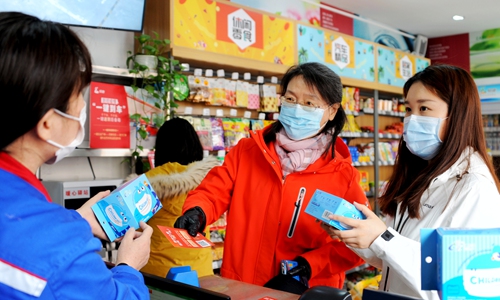
Consumers purchase face masks for children in a Sinopec gas station in Beijing. Sinopec Beijing Oil Products Co began selling masks for children in its 50 gas stations in the capital city on Tuesday with supplies limited to 10,000 pieces per day. Plus, the firm's surgical mask supplies have increased to 150,000 per day. Photo: cnsphotos
Beijing's Xicheng district will issue digital vouchers worth 150 million yuan ($21.2 million) in the three months starting from Wednesday, the first district in the Chinese capital to do so, in a bid to unleash local residents' pent-up demand and to speed up the recovery of an economy battered by COVID-19.
The vouchers will cover a wide variety of businesses including supermarkets, restaurants, cultural sites, shopping malls, sports facilities, tourism, education and other parts of the services sector. The vouchers will benefit local consumers and businesses and drive overall consumption growth, local officials said at a press briefing on Wednesday. Coupons are being randomly distributed to consumers.
Enterprises involved include luxury department store Galeries Lafayette, Hanguang Shopping Mall and Xidan Joy City in downturn Beijing.
The campaign will have three phases: boosting online consumption, promoting the integration of online and offline businesses, and facilitating offline consumption, local officials said.
A Beijing-based white-collar worker surnamed Zhang said she is excited to see that Galeries Lafayette, a shopping mall she has visited regularly, is on the list.
"Beijing has adopted strict work resumption measures to prevent an outbreak of the coronavirus, and I have sheltered at home. But with the distribution of the coupons, I believe it's an official signal that it's the right time for me to go out and shop," Zhang told the Global Times on Wednesday.
"Since spring has come, I will step out and buy clothes with my friends this weekend," said Zhang.
After being tried out in many cities and proven to be successful in stimulating spending, the measure is finally being applied in the capital and will surely be effective in Beijing as well, Liu Dingding, a Beijing-based industry insider, told the Global Times on Wednesday.
Industry insiders expect more districts in Beijing to follow suit. Some suggested that vouchers distributed in different districts in the capital could have different focuses. For example, vouchers in Chaoyang district could prioritize consumption in entertainment and the catering industry, while in Haidian district the focus should be on education.
Sending out digital vouchers would be more effective than direct cash distributions, which many other countries have adopted, Liu said. "A voucher worth 10 yuan could stimulate consumption worth 100 yuan or more. Coupons also have an expiration date, which encourages consumers to spend as early as they can," Liu explained.
A number of other cities including Wuhan, Central China's Hubei Province and Hangzhou, capital of East China's Zhejiang Province, have issued digital vouchers worth more than 1 billion yuan in recent days. According to media reports, the first round of digital coupons started in Hangzhou city which has so far driven consumption worth more than 1.25 billion yuan in the city.
In the first quarter of this year, Beijing's GDP contracted 6.6 percent year-on-year to reach 746.22 billion yuan.
While calling for more "targeted distribution" to low-income and vulnerable groups, analysts said vouchers will encourage people to take the first step. It will be a combination of fiscal and monetary policies, and other stimulus measures, that could push the world's second-largest economy back to the fast track.


